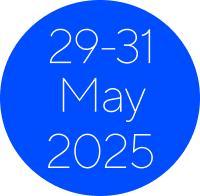Chair: Nihad A. Almasri (Jordan)
Speakers: Elizabeth Anderson (Sierra Leone), Zehra Habib (Pakistan), Durga Shah (United States)
- Discuss the process of applying global education standards and adapting contextual modifications to effectively address the unique challenges of physiotherapy education and service delivery in Low– and Middle-Income Countries (LMIC).
- Analyze case studies illustrating successful capacity-building initiatives through education and empowerment in Tajikistan, Pakistan, and Sierra Leone, aimed at enhancing physiotherapy services for individuals with disabilities.
- Recognize the pivotal role of the International Organization of Physical Therapists in Pediatrics (IOPTP) in fostering collaboration among pediatric physiotherapists worldwide, specifically in advancing practice, education, and research initiatives.
The symposium will highlight initiatives that mitigate global demand for physiotherapy education and services to address rehabilitation needs in low- and middle-income countries (LMICs), aligning with Rehabilitation 2030 [1,2]. Emphasizing the urgency of action where most of the 2.4 billion individuals requiring rehabilitation services reside, we will showcase ongoing efforts to improve access, respond to emergencies, and enhance competencies of rehabilitation professionals [2]. The symposium underscores the vital role physiotherapists play in mitigating healthcare disparities and advancing health equity. The Rehabilitation Competency Framework [3], World Physiotherapy Educational Framework [4], and Health Systems Theory [5] will provide the framework for the symposium.
A collaborative effort between World Physiotherapy and stakeholders has resulted in the development of Tajikistan’s first entry-level physiotherapy program[6,7]. This program was developed to overcome shortages of physiotherapy services. Over five years, stakeholders collaborated to address the urgent needs of physiotherapy professionals in Tajikistan. Activities including the development and implementation of a physiotherapy curriculum, establishment of clinical pathways and guidelines, review of national standards, and advocacy for the establishment of a representative body for physiotherapists will be critically appraised.
In Pakistan, the establishment of a pediatric physiotherapy residency program at the Aga Khan University Hospital underscores the significance of contextual modifications to meet local needs while collaborating with international academic organizations [8,9,10]. This program is a unique example of capacity-building endeavors in LMICs aimed at enhancing advanced pediatric rehabilitation services. Modeled on the American Board of Physiotherapy Residency and Fellowship Education Guidelines, it was tailored to fulfill the cultural and societal requirements of Pakistan. This advanced program focuses on benchmarking against international standards and promotes international networking to enhance expertise in pediatric physiotherapy. The outcomes and the sustainability of the program will be discussed.
In Sierra Leone, health workers were provided with contextual training to become rehabilitation therapists [11,12]. The project aims to bridge the gap between the demand for rehabilitation services and the limited supply of trained professionals, ultimately improving access to care for individuals with disabilities. Rehabilitation therapists completed theoretical and practical competency packages. Two years of training were conducted in the clinical setting where therapists provide services in hospitals and communities. Regular clinical supervision was provided. The need for a common framework for classifying community-based rehabilitation workers to ensure their effective integration into the country’s rehabilitation systems will be considered.
The International Organization of Physical Therapists in Pediatrics (IOPTP) subgroup of the World Physiotherapy has a role to play in global rehabilitation equity in education, practice, and access to resources. Considering the IOPTP mission, opportunities and challenges related to membership, outreach education efforts with free educational webinars, and website resource sharing in LMICs will be discussed.
The symposium provides recommendations to strengthen collaboration among LMICs, utilize online education tailored to countries’ specific needs wherever internet access is available, and highlight numerous resources supporting education where internet access is limited. Resources from WHO, World Physiotherapy, and IOPTP will be suggested. Additionally, ways to facilitate communication channels and conduct surveys to empower physiotherapists and communities will be recommended.
- World Health Organization, The World Bank. World report on disability. Geneva: World Health Organization; 2011.
- World Health Organization. Rehabilitation 2030: A call to action. Geneva: World Health Organization; 2017. [Online] Available from: https://www.who.int/publications/m/item/rehabilitation-2030-a-call-for-action.
- World Health Organization. Rehabilitation Competency Framework. Geneva; 2021. [Online] Available from: https://www.who.int/teams/noncommunicable-diseases/sensory-functions-disability-and-rehabilitation/rehabilitation-competency-framework.
- World Physiotherapy. Physiotherapist education framework. London, UK: World Physiotherapy; 2021.
- World Health Organization. Rehabilitation in health systems. Geneva: World Health Organization; 2017. Accessed March 2, 2021. [Online] Available from: https://www.who.int/publications/i/item/rehabilitation-in-health-systems.
- World Health Organization. Situational Analysis: State of rehabilitation in Tajikistan. Copenhagen: World Health Organization; 2015. [Online] Available from: http://www.euro.who.int/__data/assets/pdf_file/0009/276480/State-Rehabilitation-Tajikistan-Report-en.pdf?ua=1.
- Dieye S, Dawson H. Gap Analysis on the State of Physiotherapy in Tajikistan. World Physiotherapy. 2018.
- Ibrahim S, Bhutta Z. Prevalence of early childhood disability in a rural district of Sindh, Pakistan. Dev Med Child Neurol. 2013 Apr;55(4):357-363. doi: 10.1111/dcmin.12103.
- Habib-Hasan Z, Sheikh MS, Hoodbhoy Z, Azam I, O’Neil M. Early intervention physiotherapy using “parent empowerment program” for children with Down syndrome in Pakistan: a feasibility study. J Pediatr Rehabil Med. 2020;13(3):233-240.
- Carey H, Nixon-cave K, Booth M, Oleson D. Pediatric Residency and Fellowship Directors Subcommittee of the Academy of Peidatric Physical Therapy, APTA. APTA Pediatrics: Pediatric Residency and Fellowship Developmental Resource Manual. Copyright © 2018, Academy of Pediatric Physical Therapy, APTA. [Online] Available from: http://pediatricapta.org/includes/fact-sheets/pdfs/APPT-Peds-Residency-Resource.
- Robinson C. Primary health care and family medicine in Sierra Leone. Afr J Prim Health Care Fam Med. 2019 Jul 30;11(1):e1-e3. doi: 10.4102/phcfm.v11i1.2051. PMID: 31368324; PMCID: PMC6676938.
- Statistics Sierra Leone. Sierra Leone Integrated Household Survey. 2018. [Online] Available from: https://www.statistics.sl/index.php/sierra-leone-integrated-household-survey-slihs.html.
See the 24 focused symposia to be presented at congress.
Find out who the key speakers at congress will be.
Find out which clinical topics will be covered in these discussion-based seminars.




